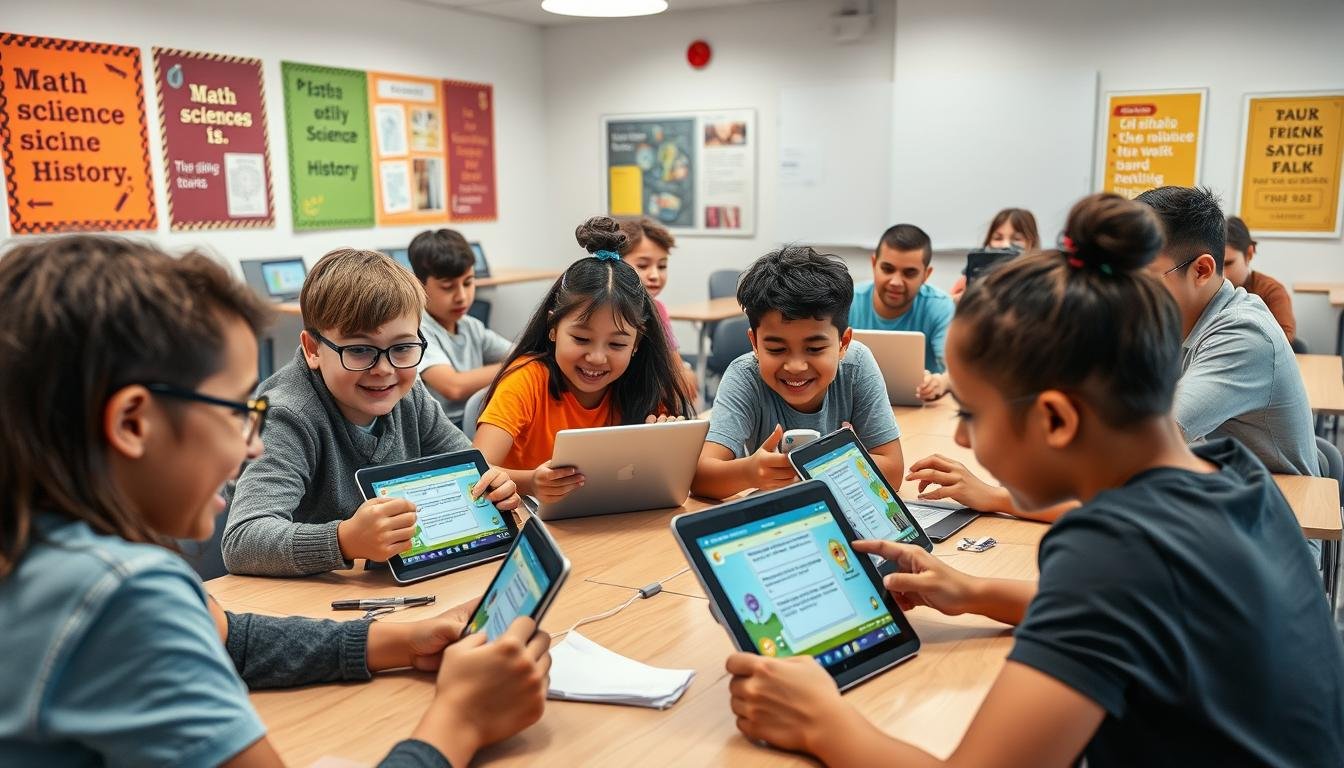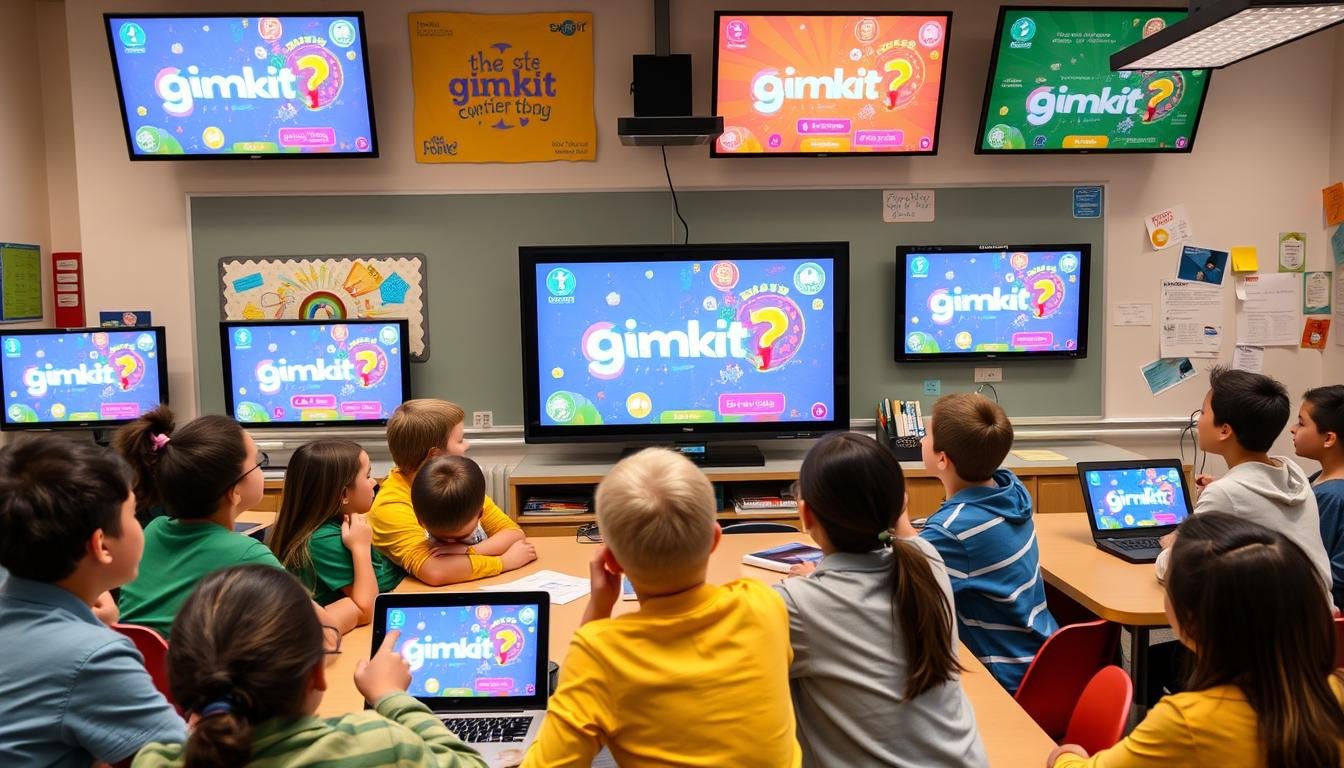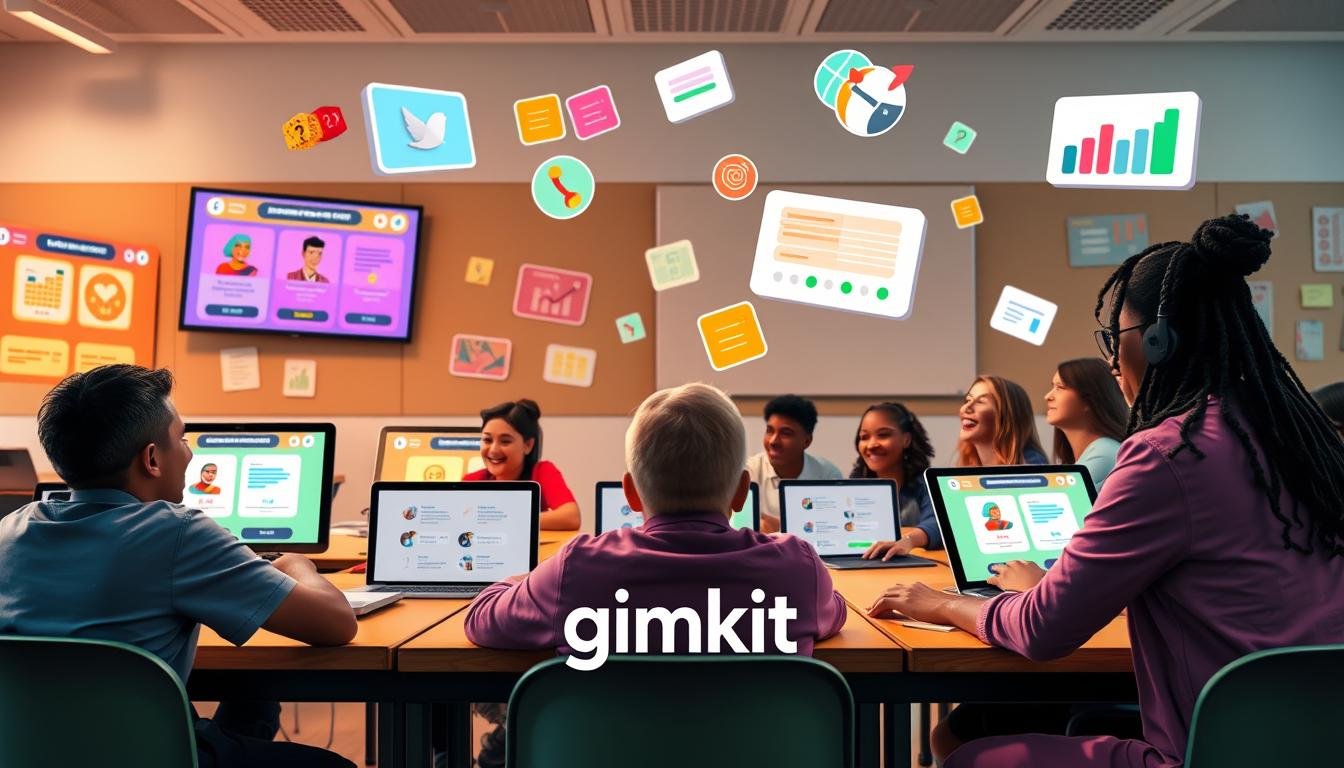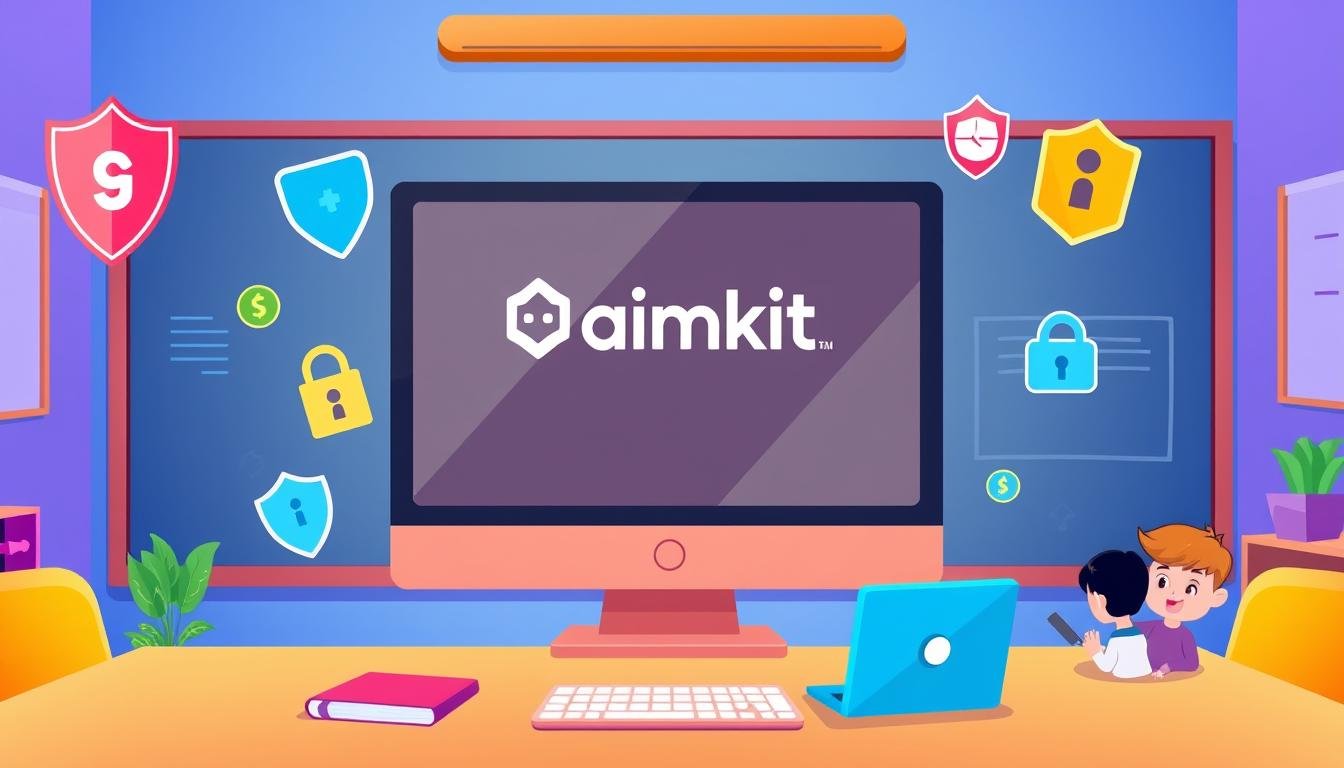What is Gimkit? It’s a cool way to learn that makes school fun. A team of teachers and tech experts made it. They turned boring lessons into fun games.
This platform uses games to teach. It makes learning exciting. Students get to enjoy learning in a new way.
Overview of Gimkit
Gimkit started in 2017 by a high school student. It shows how education tech keeps getting better. This platform makes learning fun by using games.
It was made to get students more involved and help them remember things better. This is done through fun activities.
Origin and Development
Gimkit changed the game for educational tools. It mixes games with learning, making it interactive. This has caught a lot of people’s attention.
It helps create a fun and team-based learning space. This is what modern education is all about.
Purpose and Goals
Gimkit’s main goal is to make learning fun and meet educational standards. It helps teachers create a space where students can do their best.
It helps students learn in a way that works for them. This is key for their success.
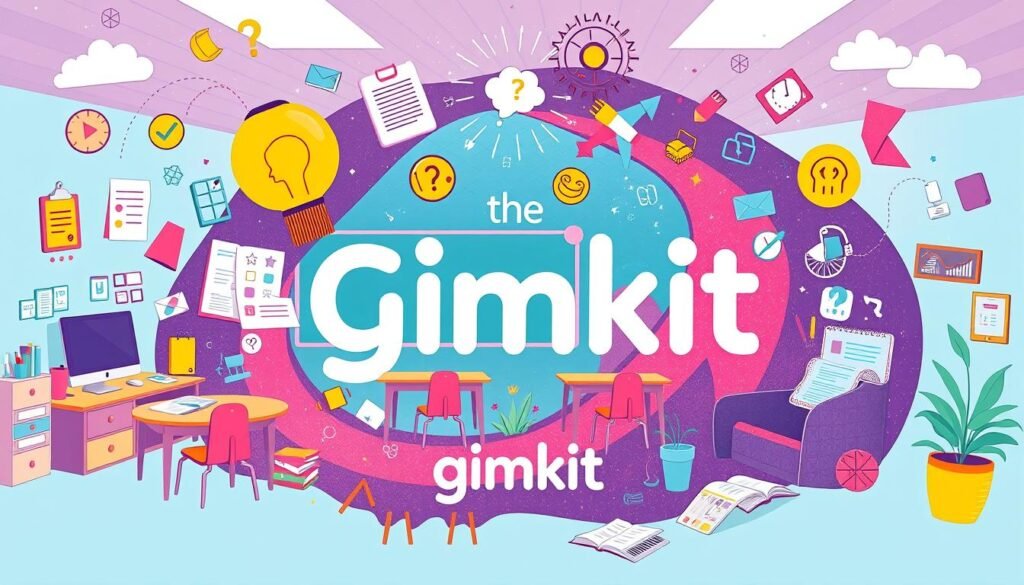
How Gimkit Works
Gimkit changes learning with fun games. Teachers and students pick from “Classic,” “Match,” and “Team Mode.” These games make learning fun and effective.
Game Formats and Features
Gimkit’s features make learning exciting. In “Classic,” students compete alone, tracking their scores. “Match” lets teams work together, boosting teamwork.
The easy-to-use design helps everyone. It makes setting up games and tracking scores simple. This makes Gimkit great for classrooms.
Educational Benefits of Gimkit
Gimkit is a game-changer in education. It makes learning fun and exciting. Students love it because it’s interactive and engaging.
This makes them want to learn more. They feel happy to share their thoughts and ideas.
Enhancing Student Engagement
Gimkit makes learning fun. It turns students into active learners. They don’t just sit and listen anymore.
They get to compete with friends. This makes them remember what they learn better. It’s a great way to keep them interested.
Promoting Active Learning
Gimkit uses games to teach. This makes students think and work together. They learn by doing, not just listening.
It’s a fun way to learn. Students enjoy it and remember what they learn. It’s good for both students and teachers.
Types of Games Available on Gimkit
Gimkit has many fun games for learning. Teachers like these games because they help students in different ways. They make learning fun and interesting for everyone.
Quiz-Based Games
Quiz games on Gimkit are very popular. They test what students know in many subjects. These games make learning fun and interactive.
Teachers can make quizzes fit their lesson plans. This helps students show what they’ve learned in a fun way.
Collaborative Learning Games
Gimkit also has games that help students work together. These games make students feel like they’re part of a team. They learn to solve problems together.
These games help students get along better. They also learn from each other. This makes school a more fun and supportive place.
Setting Up a Gimkit Account
Setting up Gimkit is easy. It’s good for teachers and students alike. You just need a few steps to get started. After you sign up, you can play games, make your own kits, and see how you’re doing.
The dashboard is designed to be easy to use. It lets you get to all the features quickly. This makes it simple to find what you need.
Creating Your Profile
The first thing to do is make your profile. It’s simple and lets you customize it for your role. You just need to give some basic info to make it your own.
After you make it, you can change it anytime. This way, your profile stays up to date with your preferences.
Navigating the Dashboard
The dashboard is where all the action happens. You can join games, make new kits, and see how you’re doing. It’s easy to use, even if you’re new.
Whether you’re getting ready for a game or looking back at your progress, it’s all here. Just a few clicks and you’re there.
Integrating Gimkit into the Classroom
Teachers can make learning fun by using Gimkit. They get many teacher resources to help. This includes pre-made kits that save time and fit their classroom needs.
Teacher Tools and Resources
Teachers can use many tools in Gimkit to make lessons better. They can see how students do in quizzes and games. This helps them change their teaching to help students more.
The platform makes learning fun and gives insights on student progress. This helps teachers teach in a way that fits each student.
Best Practices for Implementation
To use Gimkit well, teachers need clear goals for each game. They should ask students what they think to see if it works for them. This keeps learning fun and helps students grow.
Gamification in Learning
Gamification in education is a new way to make learning fun. It uses game design to help students learn better. This method makes learning exciting and helps students remember more.
Importance of Gamification
Using games in school helps a lot. It makes learning fun and interactive. Students feel happy when they do well and reach goals.
Gimkit’s Role in Gamification
Gimkit is very important in gamification. It has games that make studying fun and teach important lessons. Students learn by playing, which makes learning better.
Customization Options in Gimkit
Gimkit stands out because it lets teachers customize games. They can make games fit their lesson plans. This makes learning fun and personal for each student.
Creating Your Own Questions
Teachers can make questions that match their lessons. This makes learning more relevant for students. It’s a great way to keep students interested and learning.
Using Pre-Made Kits
Teachers who are short on time can use pre-made kits. These kits cover many subjects. They make it easy to start lessons quickly and adjust them as needed.
Analyzing Performance and Feedback
In the world of education, it’s key to track how students do. Gimkit helps teachers see how each student is doing. This lets teachers help students in the best way.
Tracking Student Progress
Gimkit’s tools help teachers see how students are doing right away. They can see who’s doing well and who needs help. This helps all students do their best.
Utilizing Feedback for Improvement
Feedback is very important for getting better. Gimkit lets teachers give feedback that really helps. This feedback helps students learn from their mistakes.
Pricing and Accessibility
Gimkit makes learning fun with different prices. You can pick from free or paid plans. This lets everyone find what fits their needs and budget.
The free plan is great for basic classroom needs. It has all you need to start. The premium plan adds more cool stuff like detailed reports and custom games.
Free vs. Premium Plans
The free version of Gimkit is perfect for teachers on a budget. It lets you make quizzes and play games with your students for free.
The premium plan has more features like detailed reports and custom games. This makes teaching even better. Both schools and private groups can find a plan that works for them.
Access for Diverse Learning Environments
Gimkit’s prices are set to help all kinds of schools. Public schools with tight budgets can use the free version.
Private schools or groups can get more features with the premium plan. This way, everyone can use Gimkit, no matter their money situation.
Future of Gimkit in Education
Gimkit’s future looks bright. It will keep growing and changing in education. With more tech in schools, Gimkit is adding cool new things. It listens to teachers to make planning lessons better and fun for students.
Upcoming Features and Innovations
In 2025, Gimkit will have new things for teachers and students. There will be advanced customization and new game modes. Educational innovations will meet different learning needs. This will make learning more personal and help teachers do their jobs better.
Potential Impact on Learning Communities
New Gimkit features will change learning communities for the better. They will make learning more fun and interactive. Teachers will use these new tools to teach in creative ways. Gimkit will keep being a key player in education.
